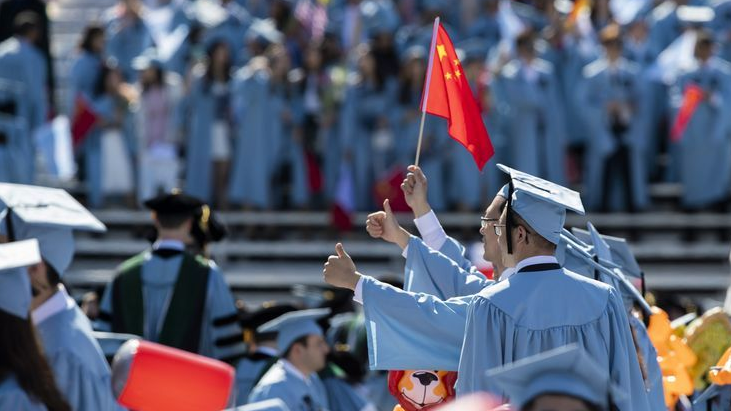Chinese students rethink US plans
 0 Comment(s)
0 Comment(s) Print
Print E-mail China Daily, August 13, 2020
E-mail China Daily, August 13, 2020

Xu Weiqing always hoped her 13-year-old daughter, who has just completed seventh grade at a Beijing middle school, would eventually study at a top US university. But she said that country's unfriendly policies, out-of-control COVID-19 pandemic and social unrest have given her second thoughts.
To boost their daughter's chances of attending a university in the United States, home to more of the world's top universities than any other country, Xu and her husband had planned to send her to an international high school in the Chinese capital or possibly to a US high school.
"However, from a policy and security perspective, the US is no longer the top choice, and we're considering sending our daughter to other countries, such as Canada, the United Kingdom or Australia," Xu said.
China is the largest source of international students in the world, with 662,100 leaving the country to study overseas in 2018. Almost half chose to study in the US.
Since 2009, China has been the biggest source of international students for US schools. According to the US-based Institute of International Education, one in three of the more than 1 million overseas students in the US came from China in the 2018-19 academic year.
However, implementation of a string of US government policies seen as unfriendly and its blaming of China for the pandemic, as well as protests over racial issues, have made many Chinese students reconsider plans to study in the US.
The UK has beaten out the US for the first time to become the preferred overseas study destination for Chinese students, according to a new report by New Oriental Education and Technology Group, an overseas study agency based in Beijing.
Significant turnaround
In a survey of 6,673 Chinese students by the company, 42 percent hoped to study in the UK, compared with 37 percent who preferred the US. That is a significant turnaround from four years ago, when 30 percent of respondents hoped to study in the UK and 46 percent planned to go to the US.
Xiao Yejiong transferred to a US high school two years ago, when he was a sophomore, to increase his chances of getting into a top US university. The senior high school student returned to his hometown in Dongguan, Guangdong province, in mid-March, just as the pandemic became more serious in the US.
"Coming home was not an easy choice, since it affects my university application, as I have not taken the SAT (Scholastic Aptitude Test), but my family and I still believe that safety is the most important thing," the 18-year-old said.
Although he is still worried about returning to the US for undergraduate studies, he said it is too late to come up with a plan B, as he has spent the past three years preparing for the US college enrollment system.
"I'm afraid my only choice is to continue to study in the US, as I would fail miserably if I participated in the national college entrance exam in China. Going to study in other countries also requires lots of preparation," Xiao said.
However, he said, recent hostile policies and rhetoric by some US politicians who oppose China appear to be deterring many younger Chinese students from choosing the country.
The idea that studying overseas guaranteed access to better education resources is gaining less traction among parents and students, Xiao said, especially as Chinese universities continue to improve academically.
A report by EIC Education, an education consultancy based in Beijing, found that 16.3 percent of students are uncertain about whether to go abroad to study, while 14.5 percent have delayed their overseas study plans by half a year and 11.3 percent have delayed them by one year due to the COVID-19 pandemic.





